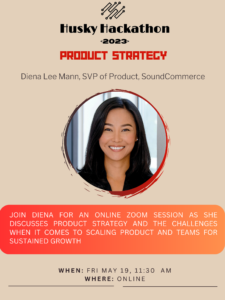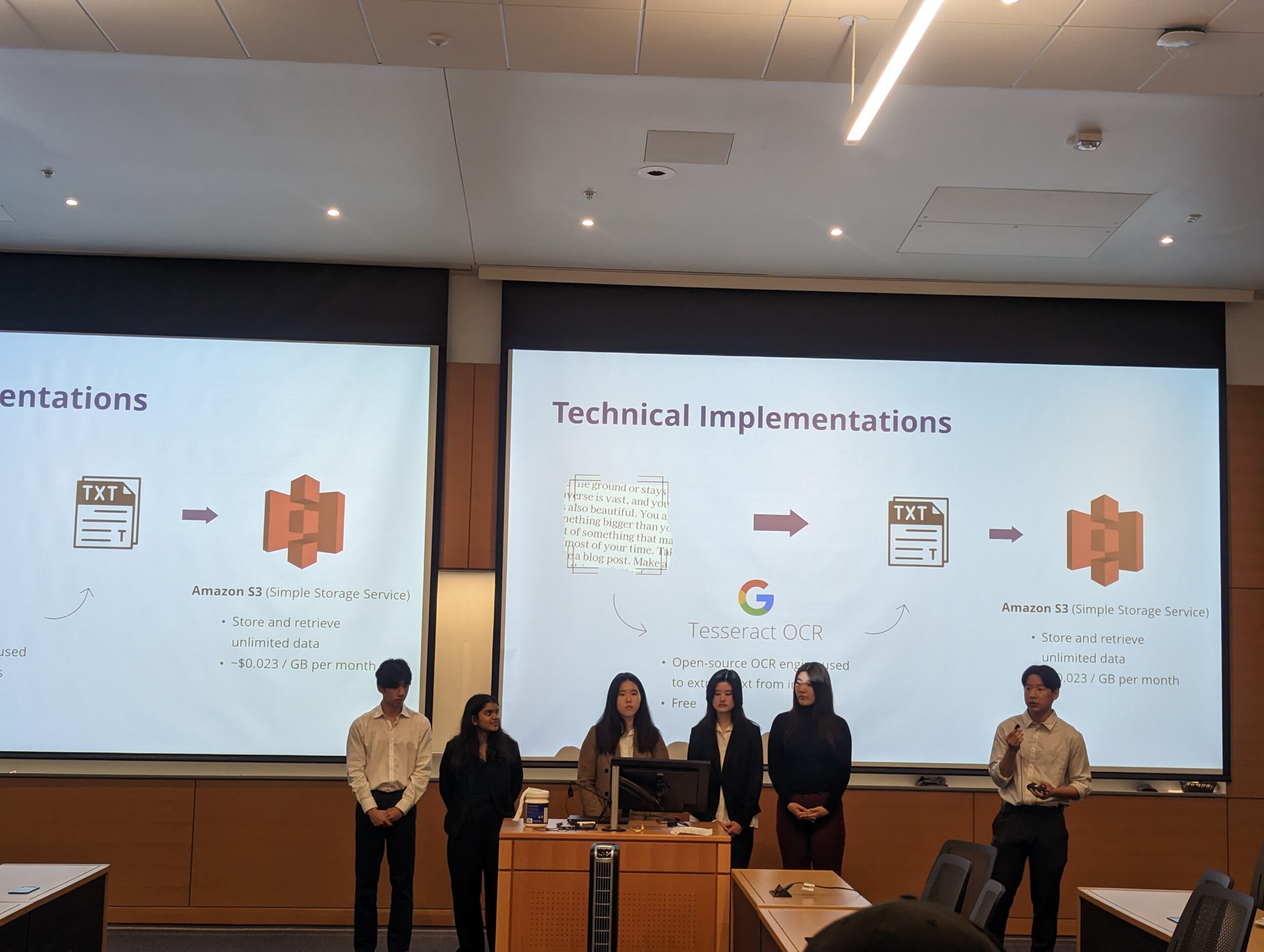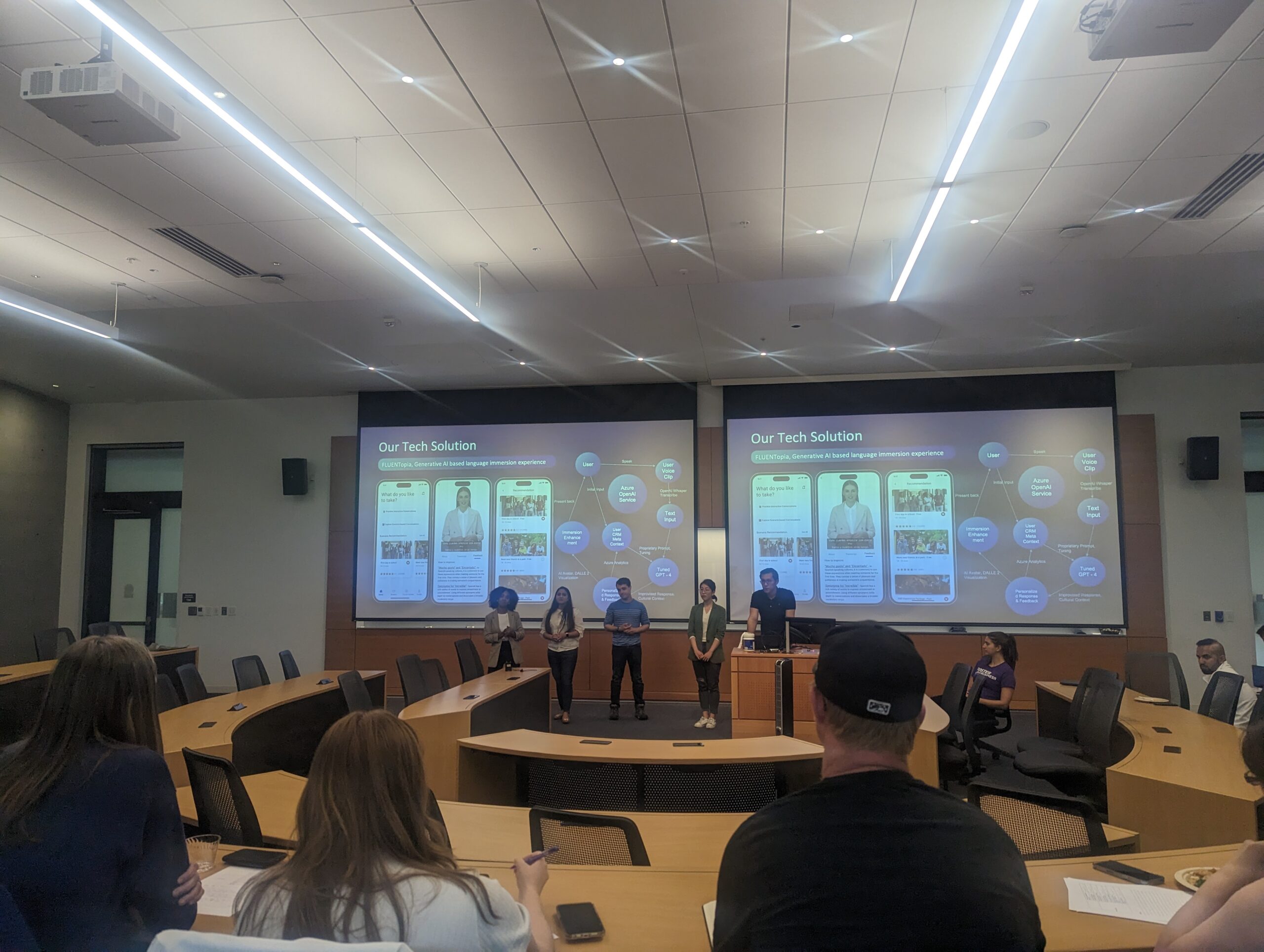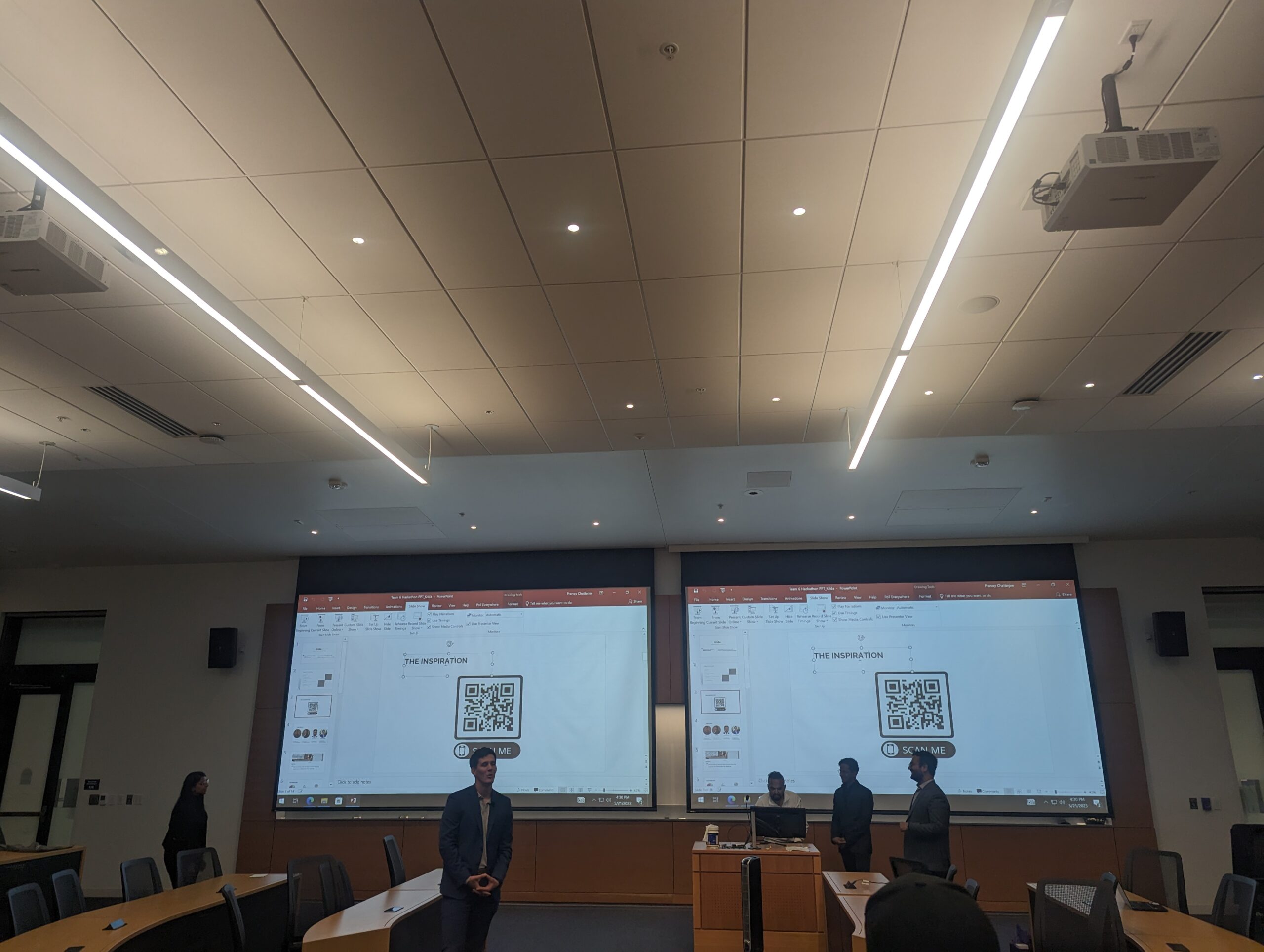Foster Tech Club hosts third Husky Hackathon
Following the successful 2021 ‘Accessibility Hackathon’, and the 2022 ‘Green Logistics Hackathon’, the tech club hosted the 2023 ‘SmartEd Hackathon’ which took place Friday, May 19th through Sunday May 21st. The Husky Hackathon engaged teams to build products that would help revolutionize education and bridge gaps in the EdTech space. It was an exciting 48 hours of building prototypes, presenting prototypes to investors, and creating businesses, with teams experiencing the entire life cycle of building a product.
The hackathon included students across all schools at the UW and participants were encouraged to take the opportunity to network with students from other schools, as well as leaders at some of Seattle’s leading companies. Applicants also had access to exclusive immersive workshops conducted by industry experts which enriched their learning. For instance, Diena Lee Mann, SVP of product at Sound Commerce conducted a session on product strategy and scaling product development for sustained growth. Other speakers included Varun Puri, co-founder at Yooli who spoke about software entrepreneurship, Stephen Sinco, former CMO of Coding Dojo and now the VP of marketing at Chowbus who spoke about the importance of Marketing / Mar-Tech in scaling startups and businesses. Matt Fischer, Senior Director of Data & Applied Science, AI+Cloud at Microsoft spoke about customer journey mapping using graph databases.

When asked about the process of planning and organizing the hackathon, Kenta Keleher, President of the Foster Tech Club, had great insights to share.
“The goal for the Hackathon planning team was to have participation from graduate students and undergrads across the many colleges within UW. As the Foster Tech Club, which is an MBA student organization, we wanted non-business students to learn about business strategy, and business students to learn about designing and building a product. The most challenging aspect when planning was to manage expectations. To do so, we invited industry leaders and academics to add multiple facets of perspectives through speaking, mentoring, and judging. Despite the planning team never having planned a Hackathon, we received a great deal of support from our guests and sponsors. After working together for months to have a smooth event, we were very happy to receive positive feedback from those who participated. We will strive to continue having interactive events that bring together the UW and local communities to promote tech.”
A total of 12 teams participated in the finals. Cash prizes were awarded to 1st, 2nd, and 3rd place teams – Vizability, Fluentopia and Krida respectively.
Viz-Ability – A team of first year computer science and business students came up with an idea of breaking down barriers to education through equitable access to technology for students experiencing reading disabilities, who find it difficult to keep up with school work. Around 20% of students have a reading disability but only 4% have access to support, team Viz-Ability shared during their pitch. The team presented a text accessibility tool which extracts text from images, PDFs and HTML and reformats text into a readable format. The camera feature will enable users to use the tool wherever they are – a unique value proposition of the product. The team will use Tesseract OCR – an open source OCR engine used to extract text from images. It will then leverage Amazon S3 which will help store unlimited data for a very minimal cost. The team proposed the idea of exploring partnerships with insurance companies/ funding agencies to lower costs for individual users.
Jeewon Jung from team Viz-Ability shared her feelings on winning the Hackathon.
“When Kenta read out “Team Three” for first place and my teammates exploded with joy next to me, it felt unreal. The hours spent that weekend in Paccar and the CS building, brainstorming ideas and refining our prototype, had led us to this outcome. And it certainly couldn’t have been done without the help of the mentors, whose expertise and encouragement helped shape our product and business plan. Husky Hackathon was an invaluable learning experience for all of us, and I’m so grateful for this opportunity to meet and work with amazing teammates, mentors, judges, and fellow participants. I’m excited to continue thinking about and working towards expanding accessibility and inclusivity through technology, and I hope that Viz-Ability can be a part of that as our team continues to develop it!”

Team Viz-Ability presenting at the Husky Hackathon 2023
Fluentopia – the 2nd prize winning team – presented a Generative AI based language immersion product, which can enhance the language learning experience for users by immersing them in the culture/country context where a particular language is spoken.
Yotam Horowitz from team Fluentopia shared the inspiration behind their idea.
“Because each of us is a 2nd generation immigrant, we were more easily able to understand the issues present for the 1st generation parents, since a younger version of us is the target customer. We realized that we were able to quickly pick up English because we were placed in an environment that was immersive. As such, we figured that we can use the advances in AI to provide an immersive language learning experience that is tailored to each customer. We remembered that our parents were frustrated that they felt disconnected to us as we were growing up. Our parents grew up in a different country, with a different culture and language. Since we grew up here in the states, we couldn’t speak our parents’ native language on the level that they could and we couldn’t fully understand what their childhood and young adulthood experience was like. No current language learning application is available in the market that can teach a 2nd language by immersing its users, so we felt that our idea could disrupt the current language learning market.”

Team Fluentopia presenting at the Husky Hackathon 2023
“We received the prompt and then sat down to discuss the current schooling process in place for K-12 in the USA. We wanted to make sure that everyone in our group understood the schooling requirements, such as curriculum, books and materials, and teaching credential mandates for public, private, and charter schools. Once we each understood how schooling works in the USA, we performed a 5C’s competitive analysis to determine the stakeholders and collaborators involved in the schooling process. We then tried to identify gaps or weaknesses in the current schooling system and how the evolution of AI could be leveraged to disrupt current systems or improve education. We then took time separately to think and brainstorm ideas and spent around an hour sharing our ideas and refining each one. After we got all of our ideas on the board, we ranked our ideas to find the best 5 or so ideas. We rated each idea by evaluating the magnitude of the issue its solve, technological feasibility of our solution, and whether our solution is both built off of sound assumptions and is differentiated enough from the current solutions available in the marketplace. We then picked the best 3 and did some research with current students, teachers, and parents to emphasize with our potential customers and validate our initial assumptions. It became clear after this research which of our solutions was most optimal.”
“We studied the annual reports for the language learning platforms currently in the market, such as Duolingo, Rosetta Stone, and Babbel. I also watched videos of test prep companies comparing the benefits and weaknesses of each service to understand how current customers feel about each product and what each product was missing in its offering.”
Krida took third place, presenting a democratic note taking app that leverages collaboration, tools, and gamification to produce the best learning outcomes for students.
“Our idea was born following a self-led, collaborative study session with Evening MBA students in the fall of 2022. The champion of this idea, Satish Jonnala, believed that the academic learning process was inefficient and in need of tools to create collaboration and effectiveness,” said Anthony Patterson of team Krida.
For this hackathon, Patterson & Jonala shared that they performed the following research steps:
- Competitive Analysis: What tools currently exist? Are there any direct competitors? Adjacent competitors?
- Market Research: Survey of MBA classmates to gather information on the customer needs & pain points.
- Market Share: Analysis on what share of the market the team could realistically capture and what that would lead to in terms of profitability
- Technical Design: Research on what tools are available and what would fit easily together for a minimum viable product (MVP).

Team Krida presenting at Husky Hackathon 2023
Leaders and mentors from top technology companies in Seattle were available to engage and support teams, including the following who judged the final:
Tori Jesse – Sr. Product Marketing Manager, Education Cloud Solutions at Microsoft
Paul Meighan – Director, Product Management, Amazon S3 & Glacier at AWS.
Jillian Mochnick – Senior Director, Global Sales Enablement at Coursera
Katie H Taylor – Associate Professor at UW College of Education
David Zager – Partner at Pioneer Square Labs
Matt Fischer – Sr Director of Data & Applied Science, AI+Cloud at Microsoft
The 2023 Hackathon built on the successful 2022 ‘Green Logistics Hackathon’ which focused on making logistics more environmentally sustainable and the 2021 ‘Accessibility Hackathon’ which aimed to bring to life creative and innovative solutions to empower people with disabilities and create a more accessible world by leveraging the power of artificial intelligence and cloud computing.
